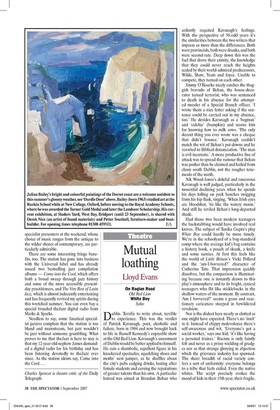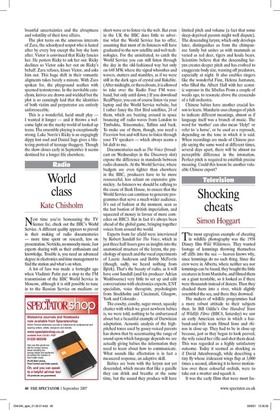Mutual loathing
Lloyd Evans On Raglan Road Old Red Lion White Boy Soho Dublin. Terrific to write about, terrible to experience. This was the verdict of Patrick Kavanagh, poet, alcoholic and failure, born in 1904 and now brought back to life in Russell Kennedy's enjoyable show at the Old Red Lion. Kavanagh's assessment of Dublin would be better applied to himself. He cuts a shambolic, repellent figure in his knackered spectacles, squelching shoes and moths' nest jumper, as he shuffles about the city's pubs cadging drinks, lusting after female students and cursing the reputations of greater talents than his own. A particular hatred was aimed at Brendan Behan who ardently requited Kavanagh's feelings. With the perspective of 50-odd years it's the similarities between the two writers that impress us more than the differences. Both were provincials, both were drunks, and both were second-rate. Deep down this was the fuel that drove their enmity, the knowledge that they could never reach the heights scaled by their world-admired predecessors, Wilde, Shaw, Yeats and Joyce. Unable to compete, they turned on each other.
Jimmy O'Rourke nicely catches the thuggish bravado of Behan, the house-decorator turned terrorist, who was sentenced to death in his absence for the attempted murder of a Special Branch officer. 'I wrote them a nice letter asking if the sentence could be carried out in my absence, too.' He derides Kavanagh as a 'bogman' and 'culchie' (bumpkin) and scorns him for knowing how to milk cows. 'The only decent thing you ever wrote was a cheque that didn't bounce.' Kavanagh couldn't match the wit of Behan's put-downs and he resorted to Biblical denunciation. 'The man is evil incarnate.' A more productive line of attack was to spread the rumour that Behan was posher than he claimed and hailed from classy south Dublin, not the rougher tenements of the north.
Nik Wood-Jones's doleful and rancorous Kavanagh is well judged, particularly in the mournful declining years when he spends his days lolling on park benches swigging from his hip flask, singing, 'When Irish eyes are bloodshot, 'tis like the watery moon.' And still he reviled Behan's long-departed shade.
Had those two been modern teenagers the backstabbing would have involved real knives. The subject of Tanika Gupta's play White Boy could hardly be more timely. We're in the schoolyard of a bog-standard comp where the average kid's bag contains a history book, a pouch of skunk, a knife and some sarnies. At first this feels like the world of Little Britain's Vicki Pollard and the 'am-I-bovvered?' character of Catherine Tate. That impression quickly dissolves, but the comparison is illuminating because one is instantly drawn to this play's atmosphere and to its bright, cynical teenagers who flit like sticklebacks in the shallow waters of the moment. By contrast, 'Am I bovvered?' seems a gross and reactionary caricature steeped in bewildered revulsion.
Nor is the dialect here nearly as clotted as one might have expected. There's no 'innif in it. Instead of chippy malevolence there's self-awareness and wit. 'Everyone's got a social worker,' says one kid; 'it's like having a personal trainer.' Racism is only faintly felt and never as a prissy wielding of grudges nor as that strange glorying in abjection which the grievance industry has spawned. The sheer breadth of racial variety confers a sort of uniformity: everyone belongs to a tribe that feels exiled. Even the native whites. The script precisely evokes the mood of kids in their 15th year, their fragile, boastful uncertainties and the abruptness and volatility of their love affairs.
The plot turns on the amorous interests of Zara, the schoolyard sexpot who is lusted after by every boy except the boy she lusts after. Victor is convinced that Ricky fancies her. He pesters Ricky to ask her out. Ricky declines so Victor asks her out on Ricky's behalf. Zara refuses, kisses Victor, and asks him out. This huge shift in their romantic aligments takes barely a minute. With Zara spoken for, the playground seethes with spurned testosterone. In the inevitable cataclysm, knives are drawn and wielded but the plot is so cunningly laid that the identities of both victim and perpetrator are entirely unforeseeable.
This is a wonderful, lucid small play — I wanted it longer — and it throws a welcome light on the murky world of tooled-up teens. The ensemble playing is exceptionally strong. Luke Norris's Ricky is an engagingly dippy lost soul and Daniel Ings gives a blistering portrait of teenage thuggery. Though the show closes early in September it seems destined for a longer life elsewhere.








































 Previous page
Previous page